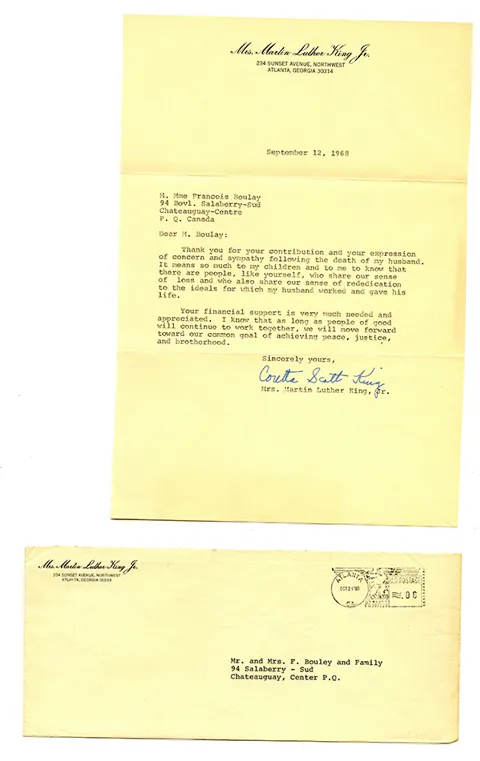The assassination of Dr. Martin Luther King Jr. on April 4, 1968, caused shock throughout America. His loss was mourned not only in our country, but throughout the whole world, and people’s reactions ran the gamut of emotions. Both civil rights organizers and the federal government urged citizens to exercise calm, but nevertheless, violence broke out in major cities across our nation.
On April 7, Americans observed a national day of mourning. Flags flew at half-staff to honor the fallen civil rights leader. The following day, Mrs. Coretta Scott King honored her husband’s commitment to the cause of the sanitation workers of Memphis by arriving in the city to lead the peaceful march that Dr. King had been unable to carry out. In the days and months that followed, Mrs. King and her four young children became the focal point of media attention as they grappled with the political, social, and personal ramifications of his death. They were inundated with calls and letters from all over the globe.
Among the people worldwide who responded to Dr. King’s death was a woman from Quebec, Canada, named François Boulay. Mrs. Boulay was inspired to send a condolence letter to Mrs. King. I can only speculate on what motivated her to write to the wife of the beloved civil rights leader.
Conceivably, Mrs. Boulay was moved by a sense of shock at the news of the assassination or maybe it was something more personal. Perhaps she felt a particular need to commiserate with a woman who was grieving the untimely death of her husband and the prospect of raising young children alone. Whatever the reason, Mrs. Boulay included a one-dollar contribution to the King family.
As modest as this sum appears, this small gesture was clearly significant to Mrs. King, who responded by sending a thank you note in early September of 1968. She wrote to Mrs. Boulay, “It means so much to my children and me to know that there are people, like yourself, who share our sense of loss and who also share our sense of rededication to the ideals for which my husband worked and gave his life.” In her letter, Mrs. King expressed genuine thanks to this well-meaning stranger for her heartfelt sentiment, but she also made sure to remind Mrs. Boulay of the importance of continuing to work towards the ideals for which her late husband had fought so hard, namely peace, racial justice and fairness.
Coretta Scott King’s touching letter has become a part of our museum’s archive. It came to us by way of Mrs. Boulay’s grandson, Nicholas Boulay, who visited the National Civil Rights Museum in 2017. Mr. Boulay was so moved by our exhibits that he offered this family memento to us for safekeeping and to help the museum tell the story of the King family and the Civil Rights Movement.
If you have a family keepsake or other object that would help tell the story of the civil rights struggle please contact me, Raka Nandi at rnandi@civilrightsmuseum.org.
